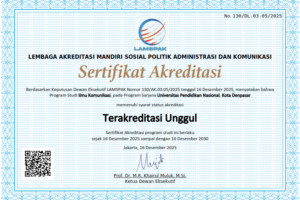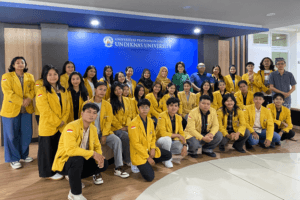
Fighting the Empty Box: Redefining Democracy for Justice and Strong Institutions
In 2024, the world continues to strive to strengthen the pillars of democracy that support peace, justice, and strong institutions. In this context, the phenomenon of the “empty box” in regional elections (Pilkada) in Indonesia has become an important focus. Dr. Drs. I Nyoman Subanda, M.Si, a lecturer at Universitas Pendidikan Nasional Denpasar, provides deep insights into the meaning of fighting the empty box in Pilkada and its implications for a healthy democracy.
Dr. Subanda explains that interpreting a social phenomenon is about providing an interpretation. The phenomenon of the empty box, which has appeared in Pilkada, has occurred several times in various regions of Indonesia. Interestingly, the empty box often wins elections against candidates promoted by political party coalitions. This phenomenon reflects various problems within our political and democratic systems.
From the perspective of political parties, Dr. Subanda emphasizes that political parties have fundamental functions such as political selection (choosing political leaders) and cadre development (carrying out political cadre development). The emergence of the empty box demonstrates the failure of political parties to perform these functions. Political parties should always be ready with candidates to be promoted, but in reality, many parties are not prepared due to their inability to carry out effective selection and cadre development.
From the perspective of power, the empty box reflects the failure of political parties to build trust and electability in the eyes of the public. Power is not just about winning or losing, but about the ability to build trust and sympathy among the public. When political parties do not believe in their electability, they are reluctant to promote candidates, which shows a lack of self-confidence and failure to build strong relationships with their constituents.
Pilkada is an arena for political parties to contest the visions and missions of regional head candidates. Dr. Subanda points out that the failure of political parties to promote candidates means they fail to formulate relevant policies for the region. Ideally, Pilkada is a place to contest visions, missions, and programs that public officials can implement.
From the perspective of the public, the empty box means the loss of alternative choices. Pilkada should provide the public with the option to choose the best public officials. However, when there is only one candidate against an empty box, the public loses the opportunity to choose based on fair and conscientious assessment. A healthy democracy involves the public in all stages of the Pilkada process, from selection to election.
The phenomenon of the empty box in Pilkada not only reflects an unhealthy democracy but also the failure of political institutions to perform their functions. To achieve the goals of Peace, Justice, and Strong Institutions, political parties must be able to effectively perform the functions of selection and cadre development, build trust with the public, and formulate relevant and visionary policies.
In 2024, we need to learn from the past to strengthen our institutions. A healthy democracy requires responsible political parties, actively engaged citizens, and transparent processes. By understanding and addressing the phenomenon of the empty box, we can strengthen our democracy and ensure that our institutions stand strong to support peace and justice.
Through the insights of Dr. Drs. I Nyoman Subanda, M.Si, we are invited to reflect and work together to build strong institutions and a healthy democracy in Indonesia. Let us use these lessons to create a better and fairer future for all.



